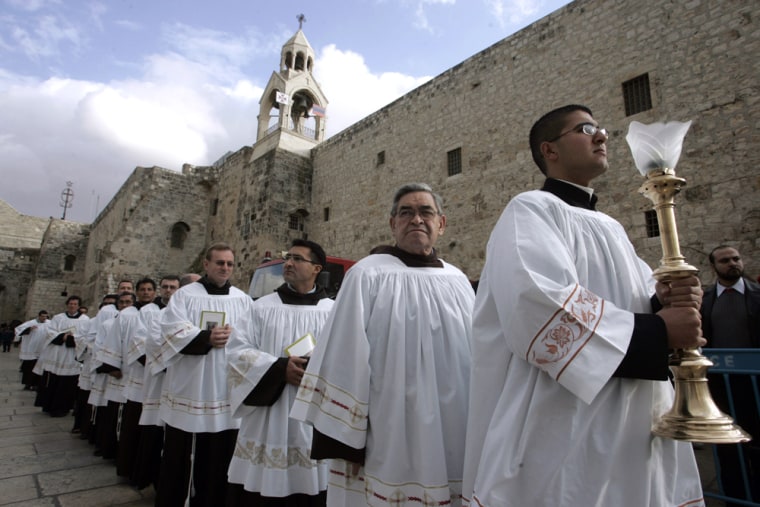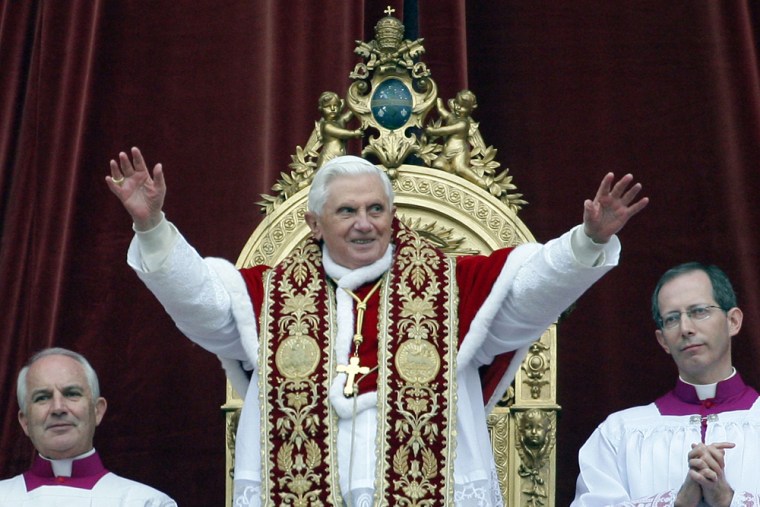VATICAN CITY — Pope Benedict XVI warned in his Christmas message Thursday that the world was headed toward ruin if selfishness prevails over solidarity during tough economic times for rich and poor nations.
Speaking from the central balcony of St. Peter's Basilica, Benedict said he was trying to inspire hope in the world.
"Brothers and sisters, all you who are listening to my words: this proclamation of hope — the heart of the Christmas message — is meant for all men and women."
The traditional papal Christmas Day message "Urbi et Orbi" — Latin for "to the City and to the World" — usually covers the globe's hot spots, but this year Benedict also addressed the economic conditions worrying many across the planet amid near-daily news of layoffs, failing companies and people losing homes.
Benedict said his Christmas message applied to "wherever an increasingly uncertain future is regarded with apprehension, even in affluent nations."
"In each of these places may the light of Christmas shine forth and encourage all people to do their part in a spirit of authentic solidarity," Benedict said. "If people look only to their own interests, our world will certainly fall apart."
Damp ceremony
Benedict said he hoped the light of Christmas would radiate to places where "the basics needed for survival are missing."
Wearing a crimson mantle against a damp chill, Benedict told tens of thousands of people in St. Peter's Square that God's saving grace could "alone transform evil into good" and "change human hearts, making them oases of peace."
Benedict dedicated part of his message to Africa, singling out Zimbabwe, where hunger is spreading and deepening. He said that people there were "trapped for too long in a political and social crisis which, sadly, keeps worsening."
International pressure has been mounting for longtime Zimbabwe leader Robert Mugabe to step down, following disputed elections in March. Millions of Zimbabwe's people need food aid, and a cholera epidemic has sharpened problems in a country once considered African's breadbasket.
Suffering also continues in the war-ravaged region of Kivu in the Democratic Republic of Congo, and in Darfur, Sudan, the pope added. In Somalia, people are weighed down with "interminable sufferings" as "the tragic consequences of the lack of stability and peace," he said.
Plea for Mideast peace
Benedict spoke of violence and tensions in the Middle East, lamenting that "the horizon seems once again bleak for Israelis and Palestinians."
He denounced what he called the "twisted logic of conflict and violence" and said he hoped dialogue and negotiation would prevail to find "just and lasting solutions to the conflicts troubling the region."
Benedict also cited Lebanon and Iraq.
Without naming any particular groups, the pope called for an end to "internecine conflict" dividing ethnic and social groups and disrupting peaceful coexistence. He also denounced terrorism "wherever" it continues to strike.
After reading a litany of the world's woes, the pope added a lighter touch, reciting holiday greetings in 64 languages, including Latin, the Church's official tongue.
The pope had rested for a few hours after celebrating Midnight Mass in St. Peter's Basilica in the early hours of Thursday.
Earlier service
During that ceremony, the pope lamented the suffering of children who are abandoned, living on the streets or forced to serve as soldiers in conflicts.
In the splendor of St. Peter's Basilica, Benedict marked the birth of Jesus with a call to the faithful to help children who are denied the love of their parents and those who are exploited across the world.
"The Child of Bethlehem summons us once again to do everything in our power to put an end to the suffering of these children," he said.
Delivering his homily in Italian, Benedict recalled the plight of "street children who do not have the blessing of a family home, of those children who are brutally exploited as soldiers and made instruments of violence, instead of messengers of reconciliation and peace."
He also spoke of minors who are "victims of the industry of pornography and every other appalling form of abuse, and thus are traumatized in the depths of their soul."
The pope did not specifically mention the issue of lawsuits and other complaints brought in the United States and elsewhere by Catholics who allege they were sexually abused by priests when they were youngsters.
Prayer for peace
As he recalled the birth of Jesus in biblical Bethlehem, Benedict's thoughts turned to the Holy Land and the pontiff prayed for an end to the conflict between Israel and the Palestinians.
"Let us think also of the place named Bethlehem, of the land in which Jesus lived, and which he loved so deeply," he said. "Let us pray that peace will be established there, that hatred and violence will cease. Let us pray for mutual understanding, that hearts will be opened, so that borders can be opened."
Benedict is expected to visit the Holy Land in May for what would be the first papal trip to Israel and the Palestinian territories since the late Pope John Paul II traveled there in a 2000 pilgrimage.
As Midnight Mass began on Thursday, the 81-year-old Benedict, dressed in white and gold-colored vestments, walked in a procession up the basilica's main aisle, smiling and stopping several times to shake outstretched hands and bless children.
Traditional wish
As a choir intoned a Psalm, the pope sprinkled incense on the central altar under Bernini's towering bronze baldachin before opening the service with the traditional wish for peace in Latin: "Pax vobis" ("Peace be with you"). The faithful responded: "Et cum spiritu tuo" ("And also with you").
Thousands of pilgrims, Romans and tourists packed the basilica for the midnight service. For those unable to enter there were giant screens set up in St. Peter's Square.
Earlier, as night fell on Christmas Eve, Benedict appeared briefly at his studio window to bless the crowd in chilly St. Peter's Square and light a single candle in a sign of peace.
The Vatican's Christmas festivities began with the unveiling of the larger-than-life Nativity scene next to the Vatican's largest-ever Christmas tree in St. Peter's Square. Children in red-and-white Santa hats sang Italian holiday hymns as the Vatican's Gendarmeria band played alongside.
Festive in Bethlehem
Meanwhile, Christians celebrated Bethlehem's merriest Christmas in eight years, with hotels booked solid, Manger Square bustling with families and Israeli and Palestinian forces cooperating to make things run smoothly.
The festivities in the West Bank town contrasted sharply with Hamas-run Gaza. While revelers in Bethlehem launched pink fireworks from a rooftop, militants fired more than 80 rockets and mortar shells at Israeli towns and villages, sending people scrambling for bomb shelters.
The latest attacks, and an Israeli air strike on rocket-firers that killed one person and wounded two, appeared to have buried an unwieldy six-month cease-fire that expired last week.
But 45 miles away, outside the Church of the Nativity, the traditional birthplace of Jesus, good-natured crowds of pilgrims and townspeople gathered ahead of the midnight Catholic mass that is the holiday's highlight.
A dozen pilgrims from India, Canada, Britain, the U.S. and other countries sung impromptu renditions of Christmas carols. David Bogenrief, 57, of Sioux City, Iowa, played the trumpet.
"Jesus was the prince of peace, and he can bring that peace to you. We pray for you," Bogenrief told a gaggle of children who gathered to listen.
In Manger Square, vendors hawked roasted peanuts and Santa hats. Many in the square were Muslims out to enjoy their town's annual moment at the center of world attention.
"Bethlehem is like the soul of the universe, and it's like an explosion of love here," said Stefano Croce, 46, a fashion photographer from Rome, Italy.
Bethlehem has suffered from the Israeli-Palestinian fighting of recent years, and is now surrounded on three sides by concrete slabs and fences — part of a barrier Israel has built against Palestinian suicide attackers, some of whom came from Bethlehem. The Palestinians see the barrier as a land grab and say it has strangled the town's economy.
Emigration has cut the town's Christian population to an estimated 35 to 50 percent of its 40,000 people, compared with 90 percent in the 1950s.

Israel has held peace talks over the past year with the moderate West Bank government of President Mahmoud Abbas, and the spirit of cooperation has allowed Palestinian forces a limited measure of independence in places like Bethlehem, under Israel's overall security control.
Eyad Sirhan, the Israeli military officer responsible for coordination in Bethlehem, said this week that he can talk to his Palestinian counterpart any time, "24 hours a day," about everything from police patrols to garbage collection. Every detail of the holiday preparations was meticulously discussed by the sides, Sirhan said.
Safer times mean the Palestinians have counted more than 1 million visitors to Bethlehem so far this year, a rise of more than 20,000 from 2007.
Gaza violence
The situation is dramatically different in Gaza, controlled by the Islamic militant group Hamas which seized the territory by force in June last year. An Israeli blockade prevents Gazans from leaving the territory and causes shortages of fuel and basic supplies.
The missiles fired from Gaza are inaccurate and Israelis are well drilled in taking cover, so no one was injured Wednesday, though dozens were treated for shock.
One target was Ashkelon, a Mediterranean city of 120,000.
"We demand the government take action," Ashkelon Mayor Benny Vaknin told Israel's Channel 1 TV. "People are hiding in bomb shelters and our children are taking cover under desks at school. This cannot continue."
Foreign Minister Tzipi Livni, running for prime minister in February elections, said in a speech Wednesday: "There is a point where every country and every leadership says — and this is what we say tonight as well — enough is enough."
Security officials said a big military campaign against Gaza militants had already been approved but was being delayed by bad winter weather. They spoke on condition of anonymity because of the sensitivity of Israel's military plans. Meanwhile, the military said, it has decided to hook up an improved warning system against missiles — an indication of mounting concern that Gaza militants have dramatically expanded their range.
To protest Israel's blockade, the head of Gaza's tiny Roman Catholic community — 300 in a population of 1.4 million — canceled Christmas midnight Mass. Father Manuel Musallem said the parish would instead hold an evening mass.
Security concern for Iraqi Christians
In Iraq, the Christmas Eve Mass for Baghdad's small and beleaguered Christian community started before dusk Wednesday instead of at the traditional midnight, a reflection of continued security concerns in the capital.
About 50 people attended the service in the Mar Yusif Chaldean Catholic Church, which started in the late afternoon — the same as the previous five Christmas Eves since the U.S.-led invasion — even though the overall number of attacks in the city has plummeted this year.
The worshipers quietly received communion and many lit candles at a nativity scene at the front of the church.
Christians have often been the target of attacks by Islamic extremists in Iraq, forcing tens of thousands to flee. Many of those who stayed were isolated in neighborhoods protected by barricades and checkpoints.
A coordinated bombing campaign in 2004 targeted churches in the Iraqi capital, and anti-Christian violence also flared in September 2007 after Pope Benedict XVI made comments perceived to be against Islam.
Fewer than 3 percent of Iraq's 26 million people are Christians — the majority of them Chaldean-Assyrians and Armenians, with a small number of Roman Catholics. The exact number of Christians left in Iraq is unclear, but they are thought to number several hundred thousand.
In comments on state-run Al-Sharqiya TV, Chaldean Cardinal Emmanuel III Delly called on all Iraqis "to live together in a quiet, loving, brotherly and equal life" and "not to marginalize the Christians."
